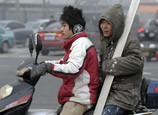
BEIJING, May 22 (Xinhua) -- A recent U.S. cyber-espionage rule barring imports of Chinese-made information technology (IT) products may provoke further opposition from industry if it is still supported by the U.S. funding bill next year, analysts said.
"For most U.S. IT companies, they don't want to see this. The act is very risky because countermeasures might result if the U.S. government insists on continuing it next year," Tu Xinquan, associate director of the China Institute of World Trade Organization Studies (WTO) at the Beijing-based University of International Business and Economics, told Xinhua.
The new provision, tucked into a funding bill signed into law by U.S. President Barack Obama late March, requires the Departments of Commerce and Justice, and the National Aeronautics and Space Administration, to seek approval from federal law enforcement officials before buying IT systems "produced, manufactured or assembled by one or more entities that are owned, directed or subsidized by China."
The annual funding bill, known as the Consolidated and Further Continuing Appropriations Act, 2013, will end by Sept. 30 and then be renewed for the fiscal year 2014.
The move has triggered discontent and resentment from the Chinese government and firms as it singled out China for a special mention, and sparked fears from U.S. industry circles for the dangerous signals it has sent.
"It's rare for the extensive document to specially pick China as a target," Tu said. The provision was probably added into the bill at the last minute by some senators for the need to seek political support, he said.
"Several U.S. IT firms that I have recently talked to said that they don't agree with the act, and the approval is indeed unwise," Tu said.
It has highlighted the tension over cybersecurity between China and the United States, the world's top two economies, after the latter accused the former of backing hacking attacks on U.S. firms and government agencies.
Chinese authorities said that the accusation lacks proof and that the country is itself a victim of hacking attacks. An official report showed that hackers tampered with 16,388 web pages in China -- including 1,802 government websites -- in 2012, up 6.1 percent and 21.4 percent year on year, respectively.
Lin Guijun, vice president of the University of International Business and Economics, said that national security is among the WTO security exceptional clauses, but this should not make it an easy excuse for trade discrimination.
"The bill only restricts purchases of Chinese IT products, and this shows obvious discrimination," Lin said.
A letter signed last month by 11 U.S. industry associations, including the Software Alliance and Emergency Committee for American Trade, to several U.S. officials said that "product security is a function of how a product is made, used and maintained, not by whom or where it is made."
The move sets "a troubling and counterproductive precedent that could have significant international repercussions and put U.S.-based global IT companies at a competitive disadvantage in global markets," the letter warned. It called for greater global cooperation and collaboration to improve cybersecurity.
Some economists believed that it is unlikely for the U.S. government to continue pursuing the policy next year, given the risks of further eroding the volatile Sino-U.S. relations amid global economic jitters.
The U.S. government should consider more constructive methods to handle the issue, because such kind of reckless action will bring chaos to international trade orders and put the interests of leading-edge U.S. firms in peril, said Li Yong, deputy director at the China Association of International Trade.
Bilateral trade between the two countries reached nearly 500 billion U.S. dollars last year, Chinese customs data showed.
















 10 million-yuan bra shines in Shengyang, North China
10 million-yuan bra shines in Shengyang, North China


![]()
